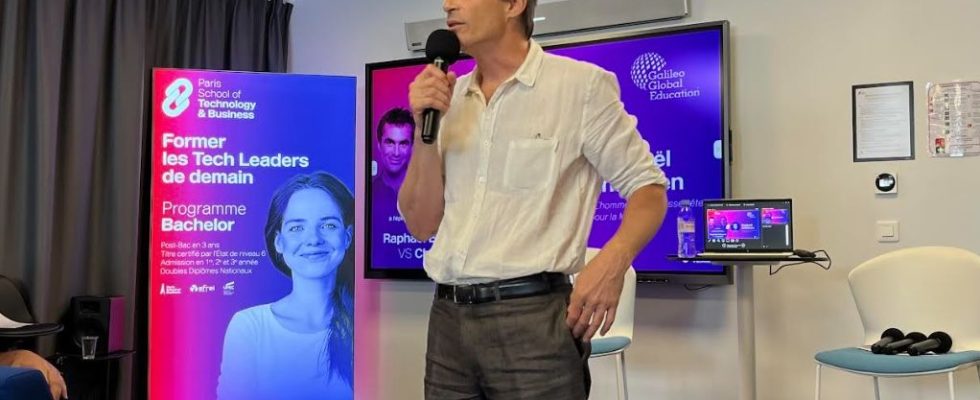- This Wednesday afternoon, the philosopher Raphaël Enthoven and the artificial intelligence (AI) ChatGPT clashed on the baccalaureate philosophy test. They had to answer the question “Is happiness a matter of reason?” “.
- A crushing victory for the philosopher, to whom the jury awards the score of 20/20 against 11/20 for artificial intelligence.
- “There are two good news for Armand Berry, organizer of this duel. The man always beats the machine. And the machine manages to have more than average. »
The human being has not yet been overtaken by the machine. This is the conclusion of the duel that took place this afternoon between the philosopher Raphaël Enthoven and artificial intelligence (AI) ChatGPT. On this day of philosophy test at baccalaureate, the high school students were not the only ones to work on the question “Is happiness a matter of reason? “. The philosopher, who graduated several decades ago, also spent the afternoon scratching pages. An opportunity to measure up to AI, which is increasingly worrying the teaching staff. The director of Paris School of Technology and Business and event organizer Armand Berry said he was inspired by a video of Monsieur Phi.
“Why train hard to do in four hours what a machine does much better in one minute? “, asks the latter in a YouTube video of philosophical popularization. From this duel, there emerges “two good news, according to the head of the establishment. The man always beats the machine. And the machine manages to have more than average. »
Weeks of AI training
More efficient than high school students, who had four hours to compose, the philosopher finished the test in 1h15. The AI, on the other hand, didn’t need more than ten minutes. It must be said that the work had been prepared by two experts in the field, Mahdi Zargayouna and Frédéric Guez. “For several weeks, we’ve been training ChatGPT by asking it philosophy questions and asking it to imitate Raphaël Enthoven’s style,” explains the first. A more complicated task than it seems. After several failures, they had to call on the help of philosophers. “It would have been quicker to do the dissertation for him,” Enthoven couldn’t help but sneer.
Mahdi Zargayouna and Frédéric Guez finally succeeded in establishing a prompt, that is to say a standard question asked to the AI allowing it to deliver a writing similar to a real copy. On D-Day, all that remained was to ask the famous question. But, even after so many efforts and attempts, ChatGPT only got 11/20. “If there is a message to remember, it is that you should not delegate to the AI an exercise that you are not able to do yourself, concludes Mahdi Zargayouna. The best prompt that could come out for this exercise would come from a philosopher, and not from an expert in AI. Enthoven, who for his part was awarded a mark of 20/20, confides that he “got the same mark as ChatGPT in his philosophy baccalaureate”. As if to comfort the losing AI.
An “extra soul” that ChatGPT does not have
“Happiness is a feeling, reason is not. How could it be a matter of reason?, launches the philosopher very naturally, as evidence. Once this angle is found, all you have to do is unroll. The two members of the jury, the philosophers Lev Frankel and Eliette Abécassis, said they were “surprised and transported” by his copy. The latter has certainly found there this “extra soul” that she expected to find in the writing resulting from a human reflection. The copy of ChatGPT, on the other hand, would be “just a succession of beautiful sentences […] without real arguments or developed reflection”.
A notorious difference, which they would have detected from the first lines. Everyone will be free to evaluate the two copies, published on the Twitter account of 20 minutes above. However, it is difficult to accuse the jury of cheating. To prevent them from being biased, the two copies were entirely copied by the same hand. For more than challengethe jurors propose to reproduce the duel by putting, this time, philosophers in control of artificial intelligence.

